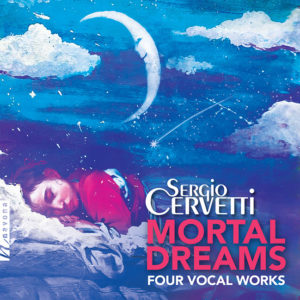
Four electro-acoustic compositions, united by the vocals and unique musical approach of Uruguayan-born American composer Sergio Cervetti, make up his ninth album “Mortal Dreams” with Navona Records.
Born 80 years ago with a career spanning more than half a century and over 100 compositions made for the concert stage, dance, theater, and film, the composer is best known and most appreciated today for his unique approach to contemporary music. Cervetti’s works are recognized especially for their blending of folk, minimalist, and electronic music with all its different traditions and aesthetics. His compositions illustrate his interest in many other fields, even those beyond the creative sphere, ranging from literature, painting, and dance to socio-political commentary and South American history. Both a supporter of the traditional and an innovator, Cervetti showcases in all his compositions in a flawless synthesis of techniques pulled from wide-ranging time periods; from baroque through to post-modernism.
The composer has a unique perspective when it comes to music. Cervetti believes that music, in and of itself, is often incapable of depiction except by association. Because of this Cervetti believes the success of his creative work is indebted to both the art of painting and the art of dance, as he believes it is the use of visual images that best conveys his feelings. This makes his compositions overflow with details and ripe with never-before-experienced forms of expression. A certain flow and easiness are also noted throughout his work which threads all these elements together and brings out layers of emotion.
Four Pieces
The first four pieces of the CD are from Cervetti’s earlier works: “Desire,” “Illness,” “Death of the Children,” and “Farewell.” The “Four Fragments of Isadora” were composed for soprano and piano in 1979, already having all his distinctive 12-tone and minimalist elements. Commissioned by Stuart Hodes, leading dancer in the Martha Graham Dance Company and chair of New York University’s Dance Department, these operatic-like fragments exhibit a clear, unifying link between music and dance. The connection is all the more evident when one considers that the titular Isadora is the iconic doyenne of American modern dance Isadora Duncan.
The piece is based on excerpts from her autobiography “My Life” and from letters written to her lover Gordon Craig. These passages reflect the dancer’s emotions and present fragments of her life at large, making the song cycle a stylized compositional biography of Isadora Duncan and a demonstration of the identity of the dancer. In the piece, the contrast between traditional vocal line and a risky piano part, painting fragments with obsessive rhythms that demand a virtuoso technique, brings contradiction and creates a strange, almost hypnotic mood. Soprano Cara Latham, leading the “Four Fragments of Isadora,” accompanied by pianist Charles Abramovic., draws inspiration from her theater background and sings with a powerful, expressive, and wealthy sound, communicating directly with a listener.
The next piece is “Childhood.” Written in 2007 this is a soprano aria and an electronic track from an unfinished work-in-progress that explores autism. It shows that Cervetti, throughout his entire career, remains dedicated to composition as an intimate medium for a personal voice and a complex storyline. This more recent composition tells another personal story, this time of an anonymous individual. It is the aria of a mother whose daughter is diagnosed with Asperger’s Syndrome. A complicated family drama plays out across the piece with a masterful interplay of all the confusing and often contradictory emotions. The mother is forever touched by her darling child and love meets heartache, hope, disappointment, confusion and peace. “Childhood” was performed by soprano Julianne Borg, who brought a fluid and effortless performance, charming the audience with her warm vocals.
“Madrigal III,” for two sopranos and a chamber ensemble, is the oldest piece on “Mortal Dreams” both physically and conceptually. Written four years earlier than “Four Fragments of Isadora,” it is based on a 15th-century poem “Solo un breve instante,” which considered the brevity of life and was written by Aztec poet-warrior ruler Nezahualcoyotl (1402-1472). Centered around a very tight tonal center, the minimalist duet is distinguished by restricted pitches and unique vocal interplay, mixing both modern and traditional baroque vocal schools and creating complex intertwined counterpoint lines for the two sopranos. Alena Hellerova and Eva Bennet lead the performance of “Madrigal III” with clear expression and impeccable technique.
Since Cervetti has consistently created electronic works at the Columbia-Princeton Electronic Center in New York City, the final track of this CD is not all that unexpected. Since Cervetti’s unconventional music is never too far away from social issues and current politics, his newly-created socio-political monologue “That Feeling of Power,” for modified voice and electronics, works as a powerful closing out of the album. It reflects on the tense current political situation from a perspective of thinly-veiled hegemony and the hypnotic prospect of wielding power.
“Mortal Dreams” is proof that Sergio Cervetti, known for his unique approach to contemporary music, is still creating with as active a mind and as open a heart as ever. This CD lurks in the transitory realm of dreams, hopes, desires and secret fantasies, presenting pieces from both Cervetti’s early and late artistic periods with distinct vocal elements hinting at the inner impressions, personal fantasies and private thoughts of passionate people’s minds. It is captivating to see the inner worlds of four distinct situations captured and immortalized by music.


